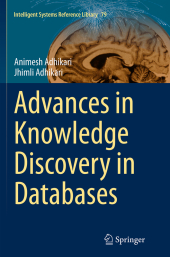 Neuerscheinungen 2016Stand: 2020-02-01 |
Schnellsuche
ISBN/Stichwort/Autor
|
Herderstraße 10
10625 Berlin
Tel.: 030 315 714 16
Fax 030 315 714 14
info@buchspektrum.de |

Animesh Adhikari, Jhimli Adhikari
(Beteiligte)
Advances in Knowledge Discovery in Databases
Softcover reprint of the original 1st ed. 2015. 2016. xv, 370 S. 136 SW-Abb. 235 mm
Verlag/Jahr: SPRINGER, BERLIN; SPRINGER INTERNATIONAL PUBLISHING 2016
ISBN: 3-319-36606-8 (3319366068)
Neue ISBN: 978-3-319-36606-7 (9783319366067)
Preis und Lieferzeit: Bitte klicken
This book presents recent advances in Knowledge discovery in databases (KDD) with a focus on the areas of market basket database, time-stamped databases and multiple related databases. Various interesting and intelligent algorithms are reported on data mining tasks. A large number of association measures are presented, which play significant roles in decision support applications. This book presents, discusses and contrasts new developments in mining time-stamped data, time-based data analyses, the identification of temporal patterns, the mining of multiple related databases, as well as local patterns analysis.
Introduction.- Synthesizing conditional patterns in a database.- Synthesizing arbitrary Boolean expressions induced by frequent itemsets.- Measuring association among items in a database.- Mining association rules induced by item and quantity purchased.- Mining patterns different related databases.- Mining icebergs in different time-stamped data sources.-Synthesizing exceptional patterns in different data Sources.- Clustering items in time-stamped databases.- Synthesizing some extreme association rules from multiple databases.- Clustering local frequency items in multiple data sources.- Mining patterns of select items in different data sources.- Mining calendar-based periodic patterns in time-stamped data.- Measuring influence of an item in time-stamped databases.- Clustering multiple databases induced by local patterns.- Enhancing quality of patterns in multiple related databases.- Concluding remarks.


